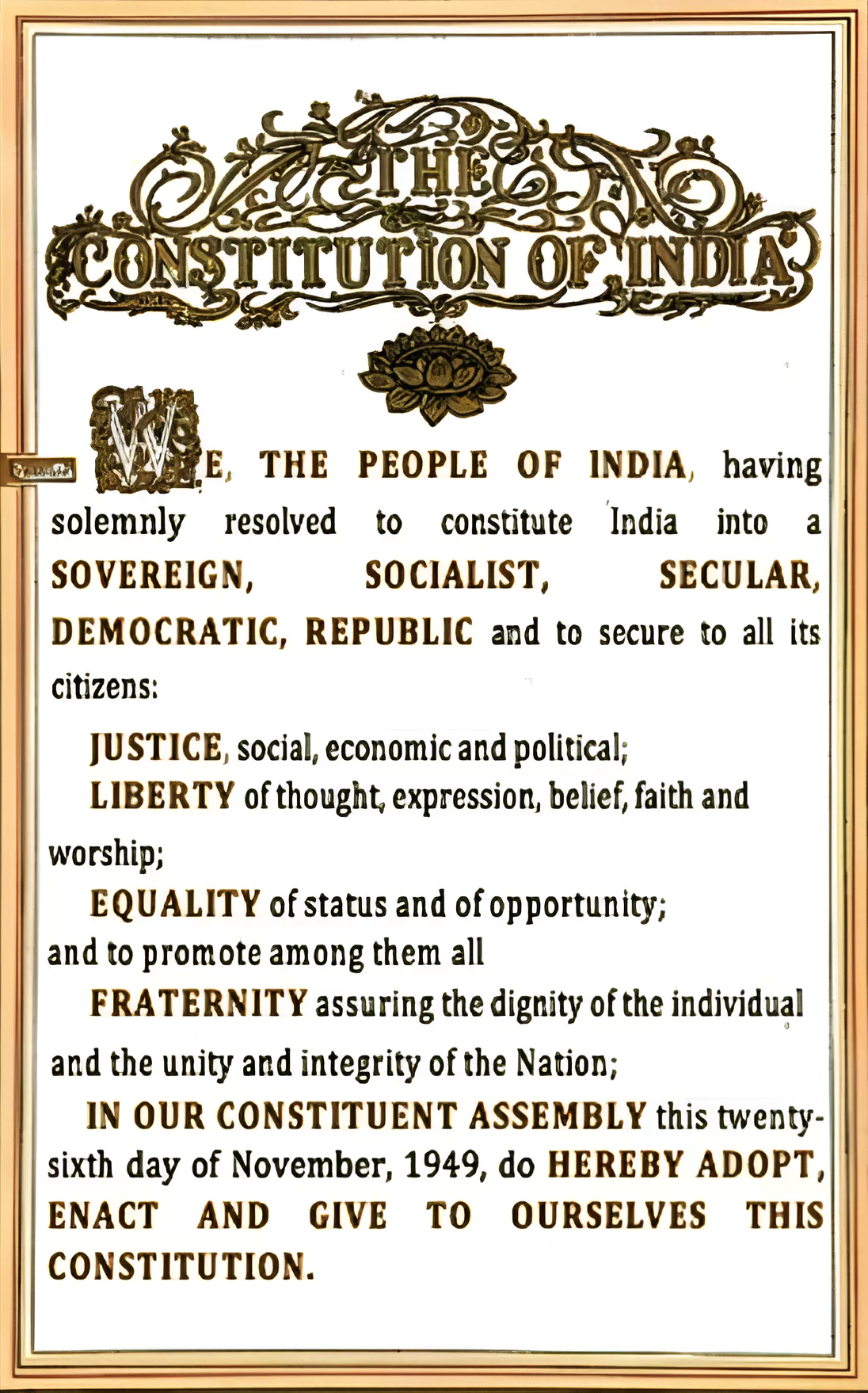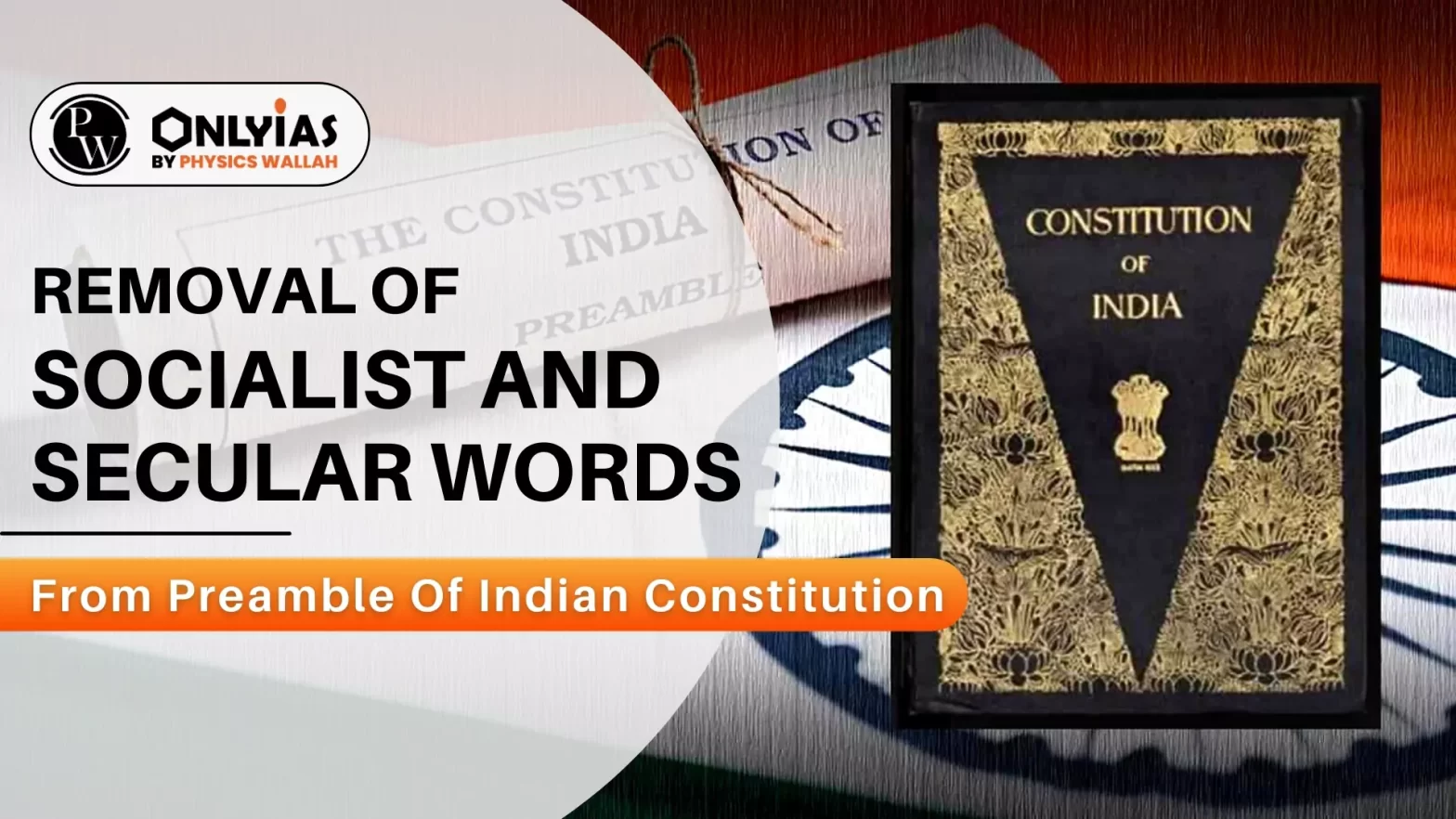Context:
This article is based on the news “Could Preamble have been amended without altering Constitution’s adoption date, SC asks” which was published in the Hindustan Times. The Supreme Court was hearing a pair of petitions that sought deletion of words secular and socialist from the Preamble of Indian Constitution.
Supreme Court Hears Petition On Deleting ‘Secular’, ‘Socialist’ From Preamble Of Indian Constitution
- Date of Adoption: Recently, the Supreme Court (SC) agreed to examine whether the words “socialist and secular” could have been inserted in the Preamble of Indian Constitution in 1976 even though the date of the adoption of the Constitution remained unaltered i.e. November 26, 1949.
- Possibility of Amending Preamble: The bench raised a query regarding the potential amendment of the Preamble.
- Can the Preamble be changed while keeping the other date intact?

Preamble of Indian Constitution: Origin, Adoption, and Its Amendability
- Origin: The Preamble of Constitution is based on the ‘Objectives Resolution’ introduced in 1946, drafted and moved by Jawahar Lal Nehru, and adopted by the Constituent Assembly.
- Introduction to Constitutional Principles: The preamble sets out the guiding purpose and principles of the Constitution. It is considered the master document of the Constitution.
- Adoption and Effective Date: Adopted on November 26, 1949, by the Constituent Assembly of India. Came into effect on January 26, 1950.
-
Amendability of Preamble Of Indian Constitution
-
- Berubari Union Case (1960): The Preamble of constitution is not a part of the Constitution.
- Kesavananda Bharti Case (1973): The preamble is a part of the Constitution. A preamble is not a source of power nor a source of limitations. The preamble has a significant role to play in the interpretation of statutes and provisions of the Constitution.
- LIC of India Case (1995): The Supreme Court has once again held that the Preamble is an integral part of the Constitution but is not directly enforceable in a court of justice in India.
- Amendment To Preamble: Introduced by the 42nd Constitutional Amendment Act, 1976 during the Emergency.
-
Who Said What?
- N.A. Palkhivala: Called the Preamble of Constitution as the identity card of the Constitution.
- Sir Alladi Krishnaswami Iyer: Described the Preamble as expressing long-held dreams and thoughts.
- K.M. Munshi: Compared the Preamble to the “horoscope” of the sovereign democratic republic.
- Pandit Thakur Das Bhargava: Expressed the Preamble’s importance as the soul, key, and jewel of the Constitution. Referred to it as a yardstick to measure the Constitution’s worth.
- Ernest Barker: Praised the political wisdom reflected in the Preamble. Described it as the “key-note” to the Constitution. Quoted it in his book, “Principles of Social and Political Theory.”
- M. Hidayatullah: Stated it as the soul of the Constitution, laying down the political society’s pattern.
|
Arguments in Favor of Retaining Socialist and Secular Words in Preamble Of Indian Constitution
- Reflecting Contemporary Values: Supporters argue that the addition of “Socialist” and “Secular” reflects the evolving values and aspirations of Indian society.
- Enhancing Clarity and Relevance: Proponents suggest that the amendment clarifies the ideological stance of the Indian state, promoting transparency and relevance.
- They assert that including “Socialist and Secular” aligns the Preamble with contemporary understandings of governance and societal principles.
- The official objective of the government in amending 1976 was to make explicit what was already provided in the Constitution.
- Constitutional Adaptability: Advocates emphasize the Constitution’s adaptability to changing circumstances through amendments. They argue that the Preamble should not remain static but evolve to address emerging challenges and aspirations.
- Promoting Social Justice: Supporters of the amendment argue that “Socialist” underscores the commitment to social justice and equitable distribution of resources. They believe that acknowledging socialism in the Preamble of Constitution reaffirms the state’s obligation to address socioeconomic disparities.
- For instance, in 2008, the Supreme Court rejected a plea demanding the removal of ‘socialist’. Then Chief Justice of India K G Balakrishnan had said that socialism hasn’t got any definite meaning. It gets different meanings at different times.
- India follows democratic socialism that aims to end poverty, ignorance, disease and inequality of opportunity. This socialistic concept ought to be implemented in the true spirit of the Constitution according to the G.B. Pant University of Agriculture and Technology v. State of Uttar Pradesh.
Indian Secularism (Positive Secularism)
- Key difference between Western Secularism and Indian Secularism:
- Indian secularism refers to treating all religions equally and without bias among its members.
- Western Secularism refers to Western civilization’s separation of state and religion and worldwide religious freedom.
- Indian Secularism was a unique form of socialism tailored to India’s needs. It does not practice secularism like France nor identify a state-sponsored religion. Panth nirpeksh is a Hindi term that translates to “religious neutrality” which describe a state that is neutral and impartial towards all religions, and which does not promote or favor any particular religion over others.
- It was different from that of countries like the USSR or China. It didn’t involve nationalising all industries but focused on selective nationalisation where necessary.
|
- Securing Pluralistic Values: Some contend that adding “Secular” reaffirms India’s commitment to secularism and religious tolerance. This inclusion was aimed to promote unity among India’s diverse religious communities.
- The 42nd Amendment simply made the term “secular” explicit in the Constitution, but the underlying principle was already implicit in various provisions and the overall philosophy of the Constitution. Articles 25, 26, and 27 were specifically designed to promote secularism.
- In a landmark judgement in the S.R. Bommai case (1994), the Supreme Court upheld that secularism is a ‘basic feature’ of the Constitution.
- Political Legitimacy: Supporters argue that the amendment was enacted through constitutional procedures, reflecting the will of the people’s elected representatives.
- For instance, in the Minerva Mills case, the Supreme Court held that the 42nd amendment to the preamble of constitution was not only within the framework of the Constitution but also gave vitality to its philosophy.
Arguments for Removal of Socialist and Secular Words from Preamble Of Indian Constitution
- Threat to Original Intent: Some argue that amending the Preamble dilutes the original intent of the Constitution’s framers. They contend that inserting new words alters the fundamental character envisioned by the founding fathers.
- For instance, Vishnu Shankar Jain’s Petition: The original Constitution makers deliberately chose to keep these concepts out of the Preamble.
- On November 15, 1948, Professor KT Shah proposed adding the words “secular, federal and socialist nation”, but the Constituent Assembly (CA) rejected it after a lengthy discussion.
- On November 25, 1948, a second amendment was introduced and discussed incorporating the word ”secular” in the draft Constitution. That, too, was rejected.
- On December 3, 1948, a third attempt was made to include “secular” in Article 18 of the Constitution, which was also dismissed by the Constituent Assembly.
- Violation of Constitutional Principles: Adding “Socialist and Secular” may contradict other constitutional principles. They argue that imposing specific ideologies through the Preamble may infringe upon the Constitution’s commitment to pluralism and neutrality.
- For instance, a joint petition by Balram Singh, Karunesh Shukla, and Pravesh Kumar’s in 2020 argues against the 1976 amendment as conflicting with constitutional tenets. They argued that it violates freedom of speech, expression (Article 19(1)(a)), and freedom of religion (Article 25).
- The petition also challenged the insertion of the words “secular” and “socialist” in Section 29 A (5) of the Representation of People Act by an amendment in 1989.
- Plea seeks a declaration limiting ‘socialism’ and ‘secularism’ to the state’s sovereign functions and not applicable to citizens, political parties and social organisations.
- Political Tool: Opponents of the amendment raise concerns about the misuse of power to amend the constitution, potentially undermining the Constitution’s stability and integrity.
- For instance, many principles affirming secularism and socialism were contained in the Constitution originally, such as in the Directive Principles of State Policy, fundamental rights that allow the freedom to profess and propagate one’s religion, etc.
- Historical Context: There are arguments that the amendment may not align with the original principles of the Constitution.
- Dr. B R Ambedkar’s rationale for omitting these terms was based on the belief that the principles of secularism and socialism were inherently ingrained in the constitution’s framework.
- Legal Implications: Scholars and legal experts raise question of whether such changes should be subject to the same rigorous process as amending other parts of the Constitution.
- For instance, Subramanian Swamy’s Petition in 2020 argued that it was not possible for policymakers to vary, alter or repeal the Preamble since it was not equivalent to an ordinary statute.
- He claimed that the insertion was against the right to freedom of religion, and the concept of judicial review which formed an integral part of the basic structure of the Constitution.
Conclusion
Removing Socialist and Secular from Indian preamble upholds original constitutional intent. Whereas, retaining “Socialist” and “Secular” in the Preamble reflects contemporary values, enhances clarity, and promotes social justice. Thus, it is upto the Supreme Court, whether to retain or remove these word in the Preamble of the Constitution of India.
Also Read: Interim Budget 2024-2025


